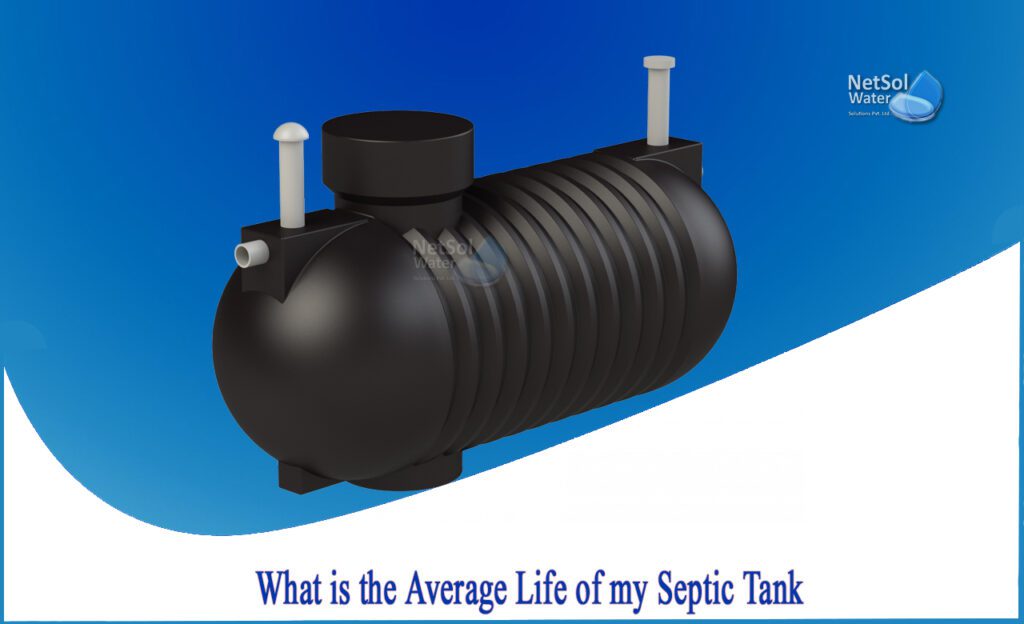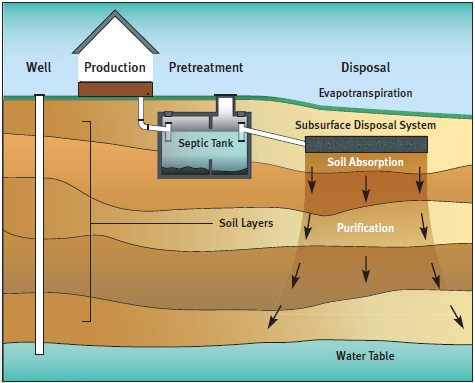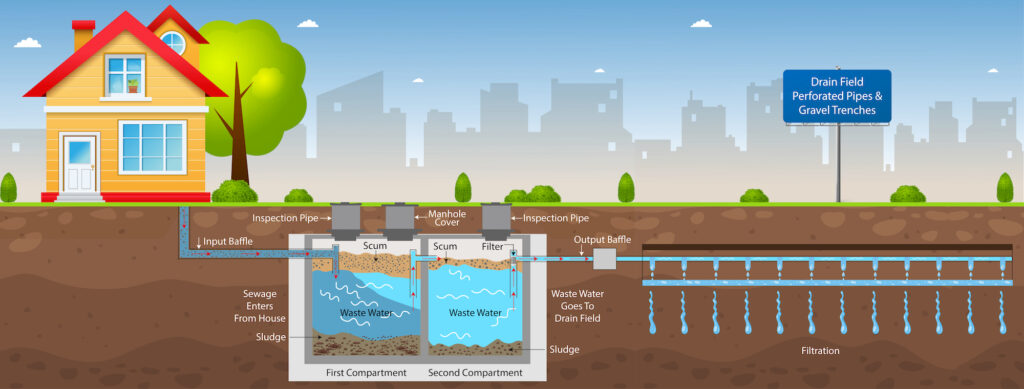Have you ever wondered if a septic tank can withstand the test of time? Well, the answer may surprise you. In this article, we will explore the possibility of a septic tank lasting 100 years. From the materials used to the maintenance required, we will examine all the factors that contribute to the longevity of a septic tank. So, if you’re curious about the lifespan of these underground systems, read on to find out if a septic tank can truly stand strong for a century.
Factors that determine the lifespan of a septic tank
Septic tanks play a crucial role in managing household wastewater in areas that are not connected to a centralized sewage system. They are designed to last for several years, but their lifespan can vary depending on several factors. In this article, we will explore the various factors that can determine the lifespan of a septic tank and the advantages they offer.
Design and construction quality
The design and construction quality of a septic tank are essential for its durability and longevity. There are several aspects to consider when evaluating the design and construction quality.
Types of septic tank materials
The material used in the construction of a septic tank can greatly impact its lifespan. Common materials include concrete, plastic, and fiberglass. Concrete septic tanks are known for their durability and can last for several decades if properly maintained. Plastic and fiberglass septic tanks are lightweight and resistant to corrosion, offering a longer lifespan compared to traditional concrete tanks.
Quality of installation
The quality of installation is another key factor in determining the lifespan of a septic tank. Proper installation ensures that the tank is correctly positioned, connected to the plumbing system, and adequately sealed. A poorly installed septic tank may be prone to leaks and other issues, which can significantly reduce its lifespan.
Size and capacity considerations
The size and capacity of a septic tank should be appropriate for the household it serves. An undersized tank may not be able to handle the volume of wastewater, leading to premature wear and tear. On the other hand, an oversized tank may not be able to maintain the necessary bacterial activity for efficient wastewater treatment. Therefore, proper sizing and capacity considerations are vital for maximizing the lifespan of a septic tank.
Maintenance and care
Regular maintenance and proper care are crucial for the longevity of a septic tank. Neglecting maintenance can lead to various issues that can significantly reduce its lifespan.
Frequency of pumping
Septic tanks require periodic pumping to remove accumulated solids and prevent clogging. The frequency of pumping depends on the size of the tank, the number of occupants in the household, and the volume of wastewater generated. Regular pumping helps maintain the optimal functioning of the septic tank and prolong its lifespan.
Proper use and disposal
Proper use and disposal practices are essential for the health of the septic tank and its longevity. Avoid flushing non-biodegradable items, such as sanitary pads, wipes, and chemicals, as they can cause clogs and damage the tank. Additionally, excessive use of harsh chemicals can disrupt the natural breakdown of waste, affecting the efficiency of the septic system.
Regular inspection and maintenance
Regular inspection and maintenance by a professional septic tank service provider are vital to identify and address any issues promptly. This includes inspecting the tank for signs of damage, checking the levels of scum and sludge, and inspecting the drainage field. Prompt repairs and maintenance can help prevent major problems and extend the lifespan of the septic tank.

Soil and environmental conditions
The soil and environmental conditions surrounding a septic tank can have a significant impact on its lifespan. Several factors should be considered when evaluating the soil and environmental conditions.
Soil composition and drainage capability
The composition and drainage capability of the soil play a critical role in the proper functioning of a septic tank. Soil that is too sandy or too compacted may not provide adequate filtration and drainage, leading to the accumulation of solids within the tank and potential system failure. It is essential to ensure that the soil composition is suitable for effective wastewater absorption.
Water table level
The water table level refers to the depth at which water is found underground. If the water table level is too high, it can interfere with the proper functioning of a septic tank. The high water table may prevent proper drainage and lead to the accumulation of wastewater in the tank, increasing the risk of system failure. Understanding the water table level is crucial for determining the lifespan of a septic tank.
Climate and weather conditions
Climate and weather conditions can also impact the lifespan of a septic tank. Extreme temperature fluctuations, freezing temperatures, heavy rainfall, and flooding can all affect the structural integrity of the tank and the performance of the drainage field. It is important to consider the local climate and weather conditions when assessing the lifespan of a septic tank.
Usage and load capacity
The usage and load capacity of a septic tank are significant factors in determining its lifespan. Several factors contribute to the usage and load capacity of a septic tank.
Number of occupants
The number of occupants in a household directly affects the volume of wastewater generated. A septic tank designed for a small household may not be able to handle the increased load if the number of occupants increases. Overloading the tank can result in system failure and reduced lifespan.
Water usage and flow rate
The amount of water used and the flow rate of wastewater can impact the lifespan of a septic tank. Excessive water usage, such as long showers, frequent laundry, and excessive irrigation, can overload the system and shorten its lifespan. It is important to be mindful of water usage to ensure the longevity of the septic tank.
Types of waste
The types of waste that enter the septic tank can also affect its lifespan. Certain items, such as oils, grease, and chemicals, can disrupt the bacterial activity in the tank and lead to system failure. Proper waste disposal practices can help maintain the effectiveness of the septic tank and extend its lifespan.
Chemical and biological additives
Some homeowners use chemical and biological additives in their septic tanks to enhance performance and promote the breakdown of waste. While these additives may offer temporary benefits, excessive or improper use can disrupt the natural balance of the tank and reduce its lifespan. It is important to use these additives according to manufacturer guidelines to avoid potential damage to the septic tank.

Advantages of septic tanks
Septic tanks offer several advantages for homeowners in areas without access to centralized sewage systems. These advantages contribute to their popularity and widespread use.
Cost-effective wastewater treatment
Septic tanks provide a cost-effective solution for wastewater treatment compared to the installation and maintenance of a centralized sewage system. The initial installation cost of a septic tank is generally lower, and the ongoing maintenance costs can be manageable if proper care is taken.
Long-term sustainability
With proper maintenance and care, septic tanks can provide long-term sustainable wastewater treatment. Their durability and longevity make them a reliable solution for managing household wastewater for many years, reducing the need for frequent replacements or repairs.
Independence from centralized sewage systems
Septic tanks offer independence from centralized sewage systems, making them a practical solution for rural areas or properties located far from municipal services. They provide homeowners with the ability to manage their wastewater autonomously and without reliance on external infrastructure.
Average lifespan of a septic tank
The lifespan of a septic tank can vary depending on various factors. It is important to have realistic expectations regarding their longevity.
Typical lifespan range
On average, a well-cared-for septic tank can last between 20 to 40 years. However, with proper maintenance, some septic tanks have been known to last even longer, reaching up to 50 years or more. It is crucial to note that this range can vary depending on the factors mentioned earlier, such as design, construction quality, maintenance, and usage.
Factors affecting longevity
As discussed, several factors can affect the lifespan of a septic tank. Neglecting regular maintenance, overloading the system, using harsh chemicals, or having poor soil conditions can significantly reduce its longevity. Adequate care, proper use, and regular inspections can help maximize the lifespan of a septic tank.

Longevity of different septic tank materials
Different materials used in the construction of septic tanks have varying lifespans. Here, we will explore the longevity of various common septic tank materials.
Concrete septic tanks
Concrete septic tanks are known for their durability and longevity. With proper maintenance and care, concrete tanks can last for several decades. Some well-built and well-maintained concrete septic tanks have been in service for over 50 years. The longevity of a concrete septic tank is attributed to its strength, resistance to corrosion, and ability to withstand soil and environmental conditions.
Plastic septic tanks
Plastic septic tanks offer a lightweight and cost-effective alternative to concrete tanks. While their lifespan is generally shorter compared to concrete tanks, with proper care, plastic septic tanks can last between 25 to 35 years. The longevity of plastic tanks is dependent on factors such as proper installation, regular maintenance, and avoiding exposure to extreme temperatures or UV radiation.
Fiberglass septic tanks
Fiberglass septic tanks are another option with a moderate lifespan. With proper maintenance and care, fiberglass tanks can last between 30 to 40 years. They offer benefits such as resistance to corrosion and lightweight construction. However, fiberglass tanks may be susceptible to damage from external pressure or heavy equipment, which can impact their longevity.
Signs of septic tank failure
Recognizing the signs of septic tank failure is essential for early detection and prompt repairs. Here are some common signs to be aware of.
Backups, slow drains, or gurgling sounds
If you notice backups in sinks, showers, or toilets, slow draining, or gurgling sounds when water is used, it may indicate a septic tank issue. These signs suggest that the tank is not properly processing wastewater and may be nearing or experiencing failure.
Foul odor
A foul odor near the area of the septic tank or drain field can indicate a leak or malfunction. The odor may be reminiscent of sewage or rotten eggs. It is important to address this issue promptly to prevent further damage and potential health risks.
Lush or soggy soil above the tank
If the soil above the septic tank or drain field appears unusually lush or soggy, it may be an indication of a problem. The septic tank may be leaking or overflowing, leading to excess moisture in the soil. This can also result in the presence of standing water or puddles above the tank.
High nitrate levels in well water
If your property relies on a well for drinking water and the nitrate levels are found to be consistently high, it may be an indication of septic tank failure. Nitrate contamination can occur when a septic tank is not functioning correctly and allows untreated wastewater to seep into the groundwater.

Conclusion
The lifespan of a septic tank is influenced by several factors, including design and construction quality, maintenance and care, soil and environmental conditions, and usage and load capacity. By understanding these factors and taking appropriate measures, homeowners can help ensure the longevity of their septic tanks. Regular maintenance, proper use and disposal practices, and prompt repairs are essential for maximizing the lifespan of a septic tank. While a septic tank may not last 100 years, with proper care and attention, it can provide reliable wastewater treatment for several decades.
